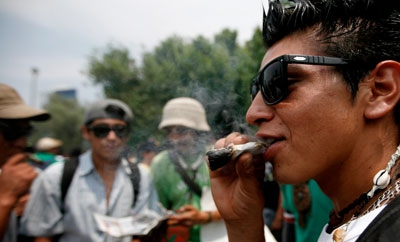Lawmakers in Mexico City have submitted proposed legislation that would decriminalize marijuana use in the capital, an initiative that has drawn praise from regional leaders but also raises questions about the effects of such a move.
On February 13, Mexico City lawmakers presented a bill to the Legislative Assembly for the decriminalization of marijuana use and regulation of sales, reported Animal Politico.
The bill, set to be analyzed next month, has three central proposals: 1) those carrying five grams of marijuana — the maximum personal dose not subject to criminal penalties — could no longer be detained and made to undergo addiction treatment as current law stipulates; 2) the city government would regulate and monitor marijuana sales through approving designated distribution points; 3) a risk reduction system would be created to help protect the health of users.
The proposal, say lawmakers, does not seek to promote consumption, but rather, to decriminalize it and minimize consumption-related risks.
Under the proposed legislation, the cultivation of marijuana would still be treated as a federal offense, as would the possession of over five kilos of the substance, while possession over five grams and below five kilos deemed for personal consumption would see a person entered into a deterrence program.
Former presidents of Mexico, Colombia, Chile and Brazil expressed their support for the initiative in a letter, praising the city’s efforts “to promote a change of paradigm that will allow us, gradually and orderly, to transition towards responsible regulation.”
InSight Crime Analysis
This long-awaited bill comes amid growing calls to decriminalize marijuana in Mexico, as well as moves by regional leaders to explore alternatives to current drug policies in the face of a perceived failure of the US-led “war on drugs.”
Countries such as Colombia and Peru have already decriminalized possession of limited amounts of marijuana, and Uruguay recently became the first country to pass a law regulating the drug’s entire production and distribution chain.
SEE ALSO: Uruguay: Marijuana, Organized Crime and the Politics of Drugs
How to formulate drug policies that will ultimately cut the profits of criminal groups is a tricky question and Mexico City’s proposed legislation raises the key issue that, with marijuana still sourced from the illicit market, a consumption-yes, production-no policy could have the unintended effect of boosting criminal profits.

